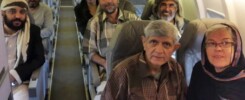INSAF Center.
For over eight years, a prominent Baha’i cleric has been in the prisons of the Yemeni authorities, where he was arrested by National Security forces in 2013. This was followed by the arrest of a group of other Baha’is in 2014, 2105 and 2016. These violations continued, and eventually led to unfair trials aimed at suppressing Baha’is due solely to their belief. On the 2nd of January 2018, the court, which was under the control of the Houthis, issued the death sentence of Hamid bin Haydara, ordered his property be confiscated, and ruled to close all Baha’i institutions and forums in the country.
On September 17, 2019, the Appeals Division demanded that the Court of First Instance uphold the deportation order of all those belonging to the Baha’i faith in Yemen, and banning the reception of any of them. During the session held on the 1st of October of the same year, and before the defense was able to submit a comment on the prosecution’s memorandum, the court decided to seize the money of Hamid and the Baha’i Forum, and assigned a judicial guard to it. These arbitrary practices by the Houthis continued and was aimed at deporting the Baha’is and controlling their money, until a decision was issued in March of this year by Mahdi Al-Mashat, head of the Supreme Houthi Political Council, to pardon the Baha’is. However, that decision remained stalled in order to obtain political gains. Eventually, the detainees were released, provided they were deported from the country. On the 30th of July 2020, they departed with an international plane to Ethiopia.
All that delay in continuing to detain the Baha’is reflected a clear desire by the Houthi authorities to try to obtain political or material gains, which was clearly visible through the conditions that were placed by them and their desire to deport the Baha’is outside the country, despite their knowledge of the seriousness of their health and psychological condition in prison. Hussein Al-Ezzi, Deputy Foreign Minister in the Houthi government, tweeted the following statement through his Twitter account: “In implementation of the directives of His Excellency Mahdi Al-Mashat, Chairman of the Supreme Political Council, the Baha’is were released in a generous gesture that embodies the Yemeni nature inclined to forgiveness and amnesty, and we hope that this noble position will be met by more commitment and full respect for the laws in force and observance of the general order of Yemeni society.” The Houthis are trying to reflect a humane and pardoning image of themselves, despite the death sentences imposed.
However, this contradicts the following points, the first of which is that the Baha’is were delayed in prison for so long without any justification. Secondly, the condition of their exile outside their country, which is inconsistent with all laws and customs. Thirdly, the fate of their money and assets, as it seems that the Houthi authorities wish to seize them.
On the other hand, the position of the “legitimate” government was shameful, as it did not play any significant role towards the Baha’is, whether during the period of their detention or even after their release. Several statements, whether by the media apparatus or by the Minister of Information Muammar Al-Eryani himself, who tweeted: “The Iranian backed Houthi militia deported six Baha’is out of Yemen, including Hamid bin Haydara, the leader of the Baha’i community in Yemen, is a crime of forced exile that is no less hideous than the crime of kidnapping them from their homes, absenteeism in detention for years, and subjecting them to the most heinous forms of psychological and physical torture and the confiscation and looting of their property.”
Through this rhetoric, the Yemeni authority was trying to employ the matter politically without any responsibility towards its citizens. It played no role during the period of their detention, nor after their release. The Yemeni government was supposed, at the very least, to receive the released, embrace them, and present an image that contradicts the image of those who were holding them detained. Not to mention that the authorities themselves were the first to arrest the Baha’i Hamid bin Haydara from his headquarters in 2013.
The position of the other political parties and activists is not any better, especially those who stand against the Houthi agenda. Their media outlets focused on the idea of the Houthis taking this sect out of the country, without considering that these detainees were hostages in Houthi prisons, and treated the situation as if they were just trying to save whatever can be saved.
To this group of politicians, the issue has turned into an opportunity to gain political points at the expense of the Baha’is who want their freedom at any cost. They are peaceful people, who want their safety and freedom. In light of a dangerous current situation full of epidemics and diseases, the cells they were put in were nothing more than rooms where they awaited death in.
It was an opportunity for these politicians to attack all opponents at once, whether the Houthis or even human rights activists and the United Nations for what they called a collusion on deportation, without the slightest interest in the fact that these people were under the threat of death and deadly epidemics, and that getting them out of prison was the priority, while of course remembering that we fully stand against the idea of expelling any citizen from his country.
The political recruitment of humanitarian causes is more dangerous to humanity than actual crimes. A crime is to detain a citizen because he/she disagrees with you on religion and belief. However, it is worst to deny him/her from their country, and furthermore to employ humanitarian issues for political goals and to overlook the full picture.
Since the establishment of INSAF Center, we have been and are in constant contact with all those involved in the Baha’is issue. We never expected that they would be deported outside their county. As we express our pleasure – from a humanitarian point of view – for the release of the detainees, we also condemn their exile from their homeland, as this only reduces one crime for a lesser one. The right to life and liberty is above all rights. As we worked to release them from prison, this will not prevent us from continuing to work for the freedom of the Bahais inside and outside Yemen, and to demand their safe return – with their heads raised high – to their homes, families, and homeland Yemen, rejecting the idea of their exile.



